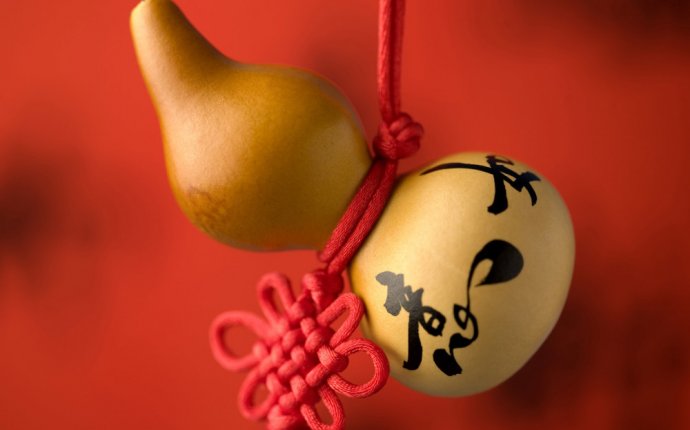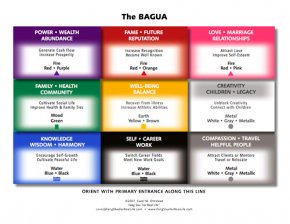
Feng Shui Ornaments
Many of us have a love-hate relationship with holidays and the emotional family gatherings associated with them. We love the aromas and the bounty of Thanksgiving food, the colors of our Christmas and Hanukkah decorations, the fun of buying and receiving gifts, and the joy of seeing friends and family. But the strain of cooking at those meals, cleaning and decorating the house, putting up—and then taking down—the tree, and entertaining all those out-of-town visitors can sometimes result in more stress than harmony. The cause of this discord may not be you or your family. It could be how you arrange your house during the holiday season.
As you get ready for the holidays this year, try following a few Feng Shui tips to balance the energy in your home and create more good will toward men and women—and a lot more fun.
Feng Shui (pronounced “fung shway”) is the art and science of arranging your interior surroundings in harmony and balance with the natural world around you. Our surroundings have a powerful effect on what we attract into our lives. When the energy around us—called chi in Feng Shui—is blocked or unbalanced, our relationships, prosperity, and family harmony can be profoundly affected. Feng Shui changes work like acupuncture for your home, unblocking the flow of energy and making you feel more comfortable in your indoor environment.
Based on an ancient Chinese practice, modern Feng Shui offers common sense and real-world guidance for placing furniture and objects and for using color. And that is especially important during the holiday season, when we add new colors, shapes, aromas—and people—to our interior environment.
Feng Shui gives us advice for surviving the entertaining, decorating, and gift-giving that surround the holidays.
Holiday Entertaining: You Are What Your Eat
The holiday season kicks off with Thanksgiving, the ultimate food holiday. The colors, aromas, and tastes of food are strongly related to good Feng Shui. Here are a few tips to help you create a peaceful and harmonious turkey day:
- • Use your dining room often during Thanksgiving because it is considered a place of wealth in Feng Shui; this is not the time to wolf down leftovers while sitting in front of the TV.
- • Bring out the good stuff—the china, crystal, silver, and all the other pieces hiding in your cabinets and closets. What are you saving them for if not for the holidays?
- • Use a centerpiece of orange flowers to encourage conversation, or a display of fresh fruit and vegetables to symbolize good health and longevity.
- • Entertaining guests is associated with wealth, so hang a mirror that reflects your dining room table and you will symbolically double your wealth.
- • Place bowls of nuts, dried fruit, and candy throughout your gathering spaces, and pitchers of wine, sparkling cider or mineral water in a central location to represent the prosperity to continually feed guests.
In Feng Shui, we divide energy into yin (the dark, heavy side), and yang (the bright, lighter side). Since the winter months are the yin side of our energy, we need to balance this darker, lower, colder energy with strong yang energy in our food for the holidays. Cooked foods, spices, and hot foods such as chile peppers, ginger, and garlic, are the perfect yang choices for Thanksgiving. Foods like raw vegetables and fish are yin, and are better used in moderation during this period.

A round or oval table is best for Feng Shui-friendly dining. The absence of sharp corners and hard edges helps conversation flow freely, and keeps the energy flow gently through the room. If you do have a rectangular dining table, avoid seating your guests close to the pointed corners where they could feel uncomfortable during the meal.
If your family is prone to arguments, keep the yang energy to a minimum where you eat: invite an even number of guests, keep the lights low and soft, and decorate with soothing earth tones like orange, gold, green and brown. And be sure to keep shiny surfaces and sharp edges to a minimum—remove the knife from the table after the turkey is carved and you will avoid sharp words and arguments.
Holiday Decorating: You are What You See
What do the colors, shapes, and textures of your holiday decorations and lights say about you? In Feng Shui, we call these the colors and shapes The Five Elements. Each Element has distinctive colors and shapes, so the tones and hues you choose to decorate your holiday home have particular meaning.
For example, the traditional Christmas colors are a combination of the Fire Element (red) that represents passion and emotion; and the Wood Element (green) that represents growth and expansion. The triangular shape of your tree is a Fire Element shape—whether it is a traditional pine or an artificial tree. And when you light up your house and your trees, shrubs, or even the saguaro cactus on your lawn, you add additional Fire Element energy to warm the dark winter days and nights.
We can also use Feng Shui principle to help decide where to place your Christmas tree. In Feng Shui, we use a chart called a bagua to divide a room into nine equal areas, then locate furniture and objects in these areas according to their colors, shapes, and meaning (See The Bagua chart, below). To use this bagua mapping chart for your tree placement, stand at the main entrance to the room, draw the floor plan, then divide it into nine equal area.
The ideal place to locate the tree is either in the Power/Wealth or the Fame/Future areas of you home, because triangular shapes displayed in these areas bring passion and emotion into your life. Another good area for the tree is the Family/Community area, because when you display objects made of wood in this area they help connect you to friends and family.
If you place the tree in the Self/Career area, use blue lights and decorations and a blue/black patterned tree skirt to help bring water energy into balance.
If your tree must be in the Creativity/Children area, or in the Helpful People area, decorate with metal ornaments, tinsel, white lights, and a silver or gold accented tree skirt.
If your tree is in the Love/Relationship area or the Knowledge/Wisdom area, use ceramic ornaments, yellow and red lights, a red skirt, and skip the tinsel.
If you place the tree in the center of the room, known as the Grounding/Balance area, chose a yellow or gold tree skirt and a bright yellow star or golden angel at the top.
Wherever you place your tree, because the triangular shape of a Christmas tree is such a powerful Fire Element symbol, it is especially important to place it far away from seating areas to ensure that it does not ignite your relationships with friends and family.
Avoid overdoing the decorations. Many people think they have to put out all of their decorations, whether they like them or not, because of the emotional attachment to them. In Feng Shui we recommend that you surround yourself with only those objects you love, and holiday decorations are no exception. If you truly do not like an object, no matter who gave it to you or how long it has been in the family, it is best not to display it. Try varying the objects you display each year and you decorations will become more meaningful.
Even if you do not have a tree, bring a bit of nature indoors by displaying evergreen branches or poinsettias to counterbalance the winter darkness and limited light of these shorter days.
If you decorate for Hanukkah, choose the traditional colors of blue (Water Element) to make your holiday flow smoothly, and silver (Metal Element) for strength. The candles in the menorah will help to gather people together, so place it where you want to create a focal point and it will draw everyone a little closer for this festival of lights.
For New Year’s Eve, decorate with the Metal Element (gold and silver), which represents creativity and focus. These are the colors of valuable coins, so displaying shiny, metallic objects on New Year’s Eve symbolizes your intention to attract wealth in the coming year.
Holiday Gift Giving: You Are What You Give
A participant in one of my workshops asked about giving her mother a gift of a high-quality kitchen knife, since she knew her mother would never spend that much money on it for herself. She had heard enough in my lecture to be concerned about sharp edges and points.









